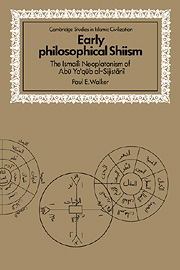Book contents
- Frontmatter
- Contents
- Preface
- Acknowledgments
- Note on transliteration
- List of abbreviations
- PART I AL-SIJISTĀNĪ'S HERITAGE
- PART II AL-SIJISTĀNĪ'S UNIVERSE
- 4 Introduction: categories of thought and terms of analysis
- 5 A theology of unqualified transcendence
- 6 Creation as command
- 7 Intellect, the sum of existent being
- 8 Descending and ascending soul
- 9 Nature and the physical realm
- 10 A cosmic anthropology
- 11 Prophecy, the deputy of intellect
- 12 Interpretation and its institution
- 13 Salvation and the womb of history
- EPILOGUE: THE USE AND CONTROL OF REASON
- Notes
- Select bibliography
- Index
12 - Interpretation and its institution
Published online by Cambridge University Press: 02 November 2009
- Frontmatter
- Contents
- Preface
- Acknowledgments
- Note on transliteration
- List of abbreviations
- PART I AL-SIJISTĀNĪ'S HERITAGE
- PART II AL-SIJISTĀNĪ'S UNIVERSE
- 4 Introduction: categories of thought and terms of analysis
- 5 A theology of unqualified transcendence
- 6 Creation as command
- 7 Intellect, the sum of existent being
- 8 Descending and ascending soul
- 9 Nature and the physical realm
- 10 A cosmic anthropology
- 11 Prophecy, the deputy of intellect
- 12 Interpretation and its institution
- 13 Salvation and the womb of history
- EPILOGUE: THE USE AND CONTROL OF REASON
- Notes
- Select bibliography
- Index
Summary
From an earlier discussion the importance of the normative world (̔lam al-waḍ̔) should be obvious. This is the critical third realm in which the moral imperative comes to define man's place in the cosmos. Significantly, al-Sijistānī does not tie it to what he himself sees as the sphere of philosophy. Rather it is an addition imposed on human society by virtue of the special relationship between God and mankind in view of man's participation in rationality not essentially but voluntarily. Because man can choose between right and wrong, good and bad, there must be a governing body that guides that choice. Such a policy exists, not as a form of natural law, but as a kind of sacramental grace. True, God imposes His will by fiat. But while God's will is reason itself, it must be conveyed to individual human beings personally. In matters related to human affairs, God elects to retain a divinely designated agency and thus preserves His moral command through a living, ever present understanding of it that emanates from an institution specifically created to dispense and sanctify it. This doctrine forms the crux of Shiism; for the Shiites both reason and the will of God reside for mankind in an ecclesiastical hierarchy of which the imam is most often the highest living embodiment.
At another and much simpler level, a standard of moral action might be determined simply by reference to its representation in the plain form of the law.
- Type
- Chapter
- Information
- Early Philosophical ShiismThe Isma'ili Neoplatonism of Abu Ya'qub al-Sijistani, pp. 124 - 133Publisher: Cambridge University PressPrint publication year: 1993

